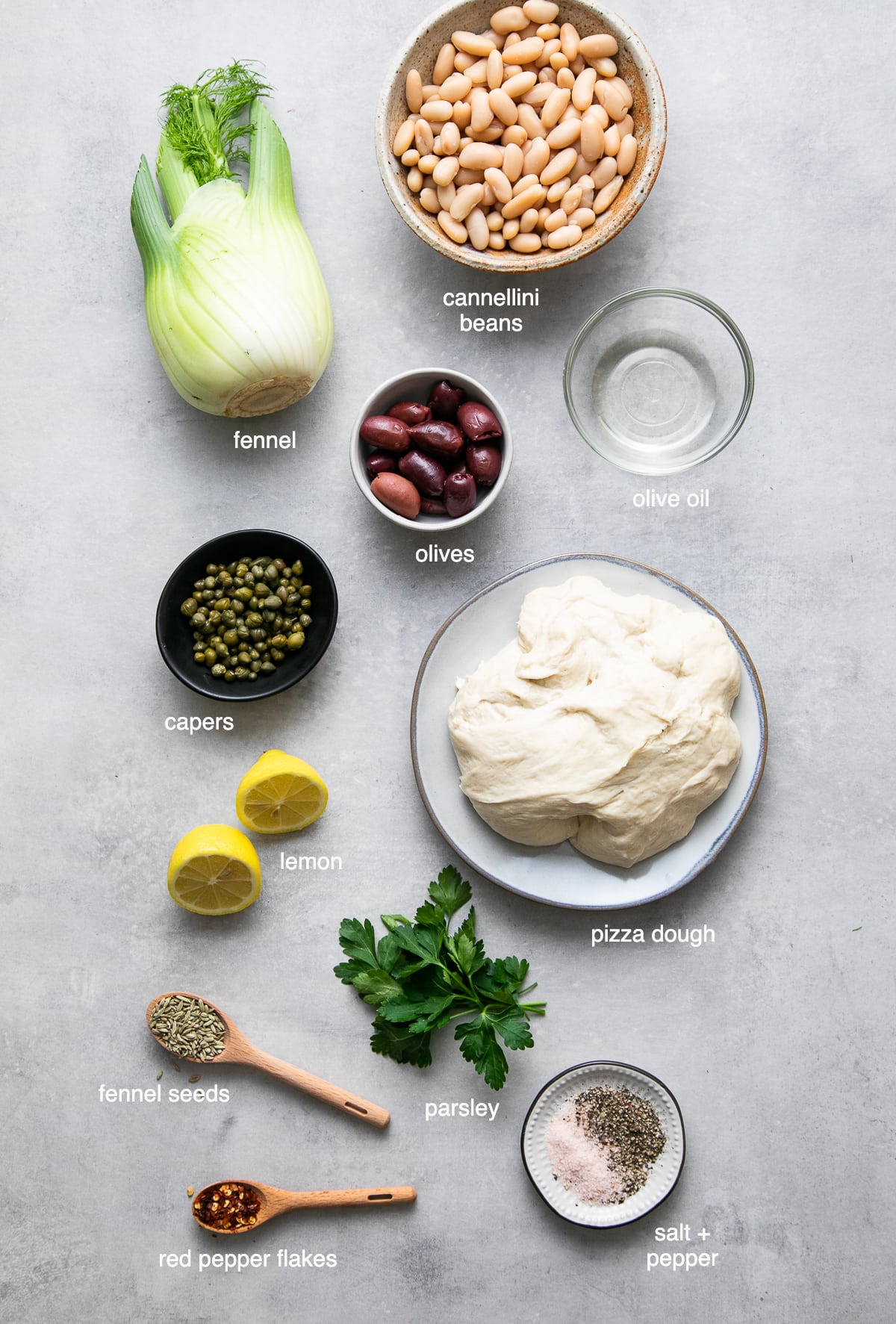Cannellini Bean & Fennel Flatbread
Cannellini Bean & Fennel Flatbread with olive spread, protein-rich beans, fennel, capers, and red pepper flakes is full of flavor and texture and makes a delicious snack, lunch or dinner!

Happy New Year to you all!
As much as I enjoyed the last year, I’m happy to begin a new year. I hope everyone finds themselves at peace, healthy, and happy as we begin a new year!
I’m starting our year with this vegan Cannellini Bean & Fennel Flatbread. It’s a great way to use this creamy white bean and fennel that I have been loving so much lately!
Inspiration for this fennel flatbread recipe was drawn from Bon Appetit and Food 52.
Cheers to a new year of great vegan food – at least I hope you find it to be as good as I do!

Ingredients You’ll Need
In this recipe, pizza dough is layered with olive spread and topped with cannellini beans, fennel, spices, and capers and baked until crust is golden and edges are crisp, creating a delicious vegan flatbread perfect for snacking, lunch or dinner.
Here is everything you will need:
- Pizza or focaccia dough – use this Artisan Bread recipe to make pizza dough or use premade pizza crust (my favorite pre-made pizza crusts are Simple Organic Pizza Crust and Stonefire)
- Fennel
- Cannellini beans – sub with your favorite white bean – great northern or chickpeas
- Olives – kalamata for the most flavor, but use your favorite black or green
- Capers
- Fennel seeds – sub with thyme or herbs de provence
- Lemon
- Olive oil
- Salt & pepper
- Red pepper flakes
- Parsley
As with all my recipes, feel free to omit anything you don’t care for. I’ve made this flatbread without the olive spread and it’s delicious as well.

How To Make Cannellini Bean + Fennel Flatbread
- Cut the fennel. Slice the stalks and ends off. Discard wilted or discolored outer layers. Slice down the center, lengthwise, and slice two halves in half. Slice thinly into 1/4-inch strips.
- Make the simple olive spread. Add the olives and lemon juice to the cup of a blender (I used a small personal blender (affiliate link), and blend until roughly combined.

- Spread the dough on a well-oiled baking sheet. Cover and let it rest for 30 minutes. Spread the dough, using the heel of your hand, and shape it into a rectangular (or any shape you prefer).
- Layer the ingredients. Spread a thin layer of the olive mix on the dough (you may have leftovers). Top with beans, fennel, capers, fennel seeds, red pepper flakes, salt & pepper.
- Bake the flatbread. Place the flatbread in a preheated oven set at 425 degrees for 20 – 25 minutes.

Serving Suggestion
- Toppings: Add a sprinkle of Almond Parmesan before serving. It would also be great topped with arugula, adding a little freshness.
- Salad: Serve with a simple Green Salad + Lemon Tahini Dressing (or use this Healthy Flax & Evo Balsamic Vinaigrette) or this hearty Vegan Caesar Salad.
- Soup: Pair with a side of Vegan Minestrone, Vegan Potato Leek Soup or Creamy Asparagus Soup + Red Lentil Soup.
- Veggies + Dip: Serve with an assortment of veggie sticks and Hummus, Vegan Ranch or Tahini-Miso Dip.

More Easy Recipes!
If you try this easy flatbread recipe, please let me know! Leave a comment and rate it below. I love to hear what you think, or any changes you make.
PrintCANNELLINI BEAN & FENNEL FLATBREAD
A simple flatbread with plenty of flavor! Serve as a meal, side or snack.
- Prep Time: 15 min
- Cook Time: 25 min
- Total Time: 40 minutes
- Yield: Serves 2 – 3 as meal or 4 – 6 as appetizer 1x
- Category: Entree, Pizza
- Method: bake
- Cuisine: Vegan
Ingredients
- 1 pizza or focaccia dough (see notes for homemade dough)
- olive oil
- 1/2 cup kalamata olives (or your favorite)
- 1 small lemon, juice of
- 1 fennel, thinly sliced about 1/4 inch or smaller
- 1 can (15 oz.) cannellini beans, drained and rinsed
- 1 –2 tablespoons capers
- 2 teaspoons fennel seeds (thyme or herbs de provence would be great too)
- mineral salt & cracked pepper to taste
- red pepper flakes to taste, optional
- chopped flat leaf parsley, to garnish
- almond parmesan, to garnish
Instructions
Preheat oven to 425 degrees F.
Cut the fennel. Slice the stalks and ends off. Discard wilted or discolored outer layers. Slice down the center, lengthwise, slice two halves in half. Slice thinly into 1/4 inch strips.
Make the simple olive spread. Add the olives and lemon juice to the cup of a blender (I used a small personal blender), and blend until roughly combined.
Spread dough on baking sheet.Place the dough on a well oiled baking sheet, let rest for 30 minutes, covered. Spread the dough, using the heel of your hand, and shape into a rectangular (or any shape you prefer).
Layer the ingredients.Spread a thin layer of the olive mix on the dough (you may have leftovers). Top with beans, fennel, capers, fennel seeds, red pepper flakes, salt & pepper.
Bake the flatbread. Bake for 20 – 25 minutes, until edges are golden and bottom is crisp.
Let cool a few minutes and slice. Top with chopped parsley.
Serve with a light dusting of almond parmesan.
Serves 2 – 3 as a meal or 4 – 6 as an appetizer.
Notes
For ease, pre-made pizza or focaccia dough works great. If you prefer to make your own dough I recommend this recipe from Food 52 or use my Artisan Bread recipe.
Here’s a quick tutorial on how to cut fennel from Better Home & Garden
FOLLOW TSV on Facebook, Instagram, Pinterest, Youtube, Subscribe (email), or RSS for more recipes and inspiration!


This looks delicious! I've been looking around for inspiration for another pizza idea, will have to try this soon!
looks so good. I love flat bread and fennel but never tried them together :)
I think you will find it to be delicious! Cheers :)
This looks amazing! I love fennel, but I never quite know what to do with it. Definitely have to try this recipe!
I am the same with fennel, I love it but never really know how to use it. Glad to have this one in the collection. I hope this works out well for you too!